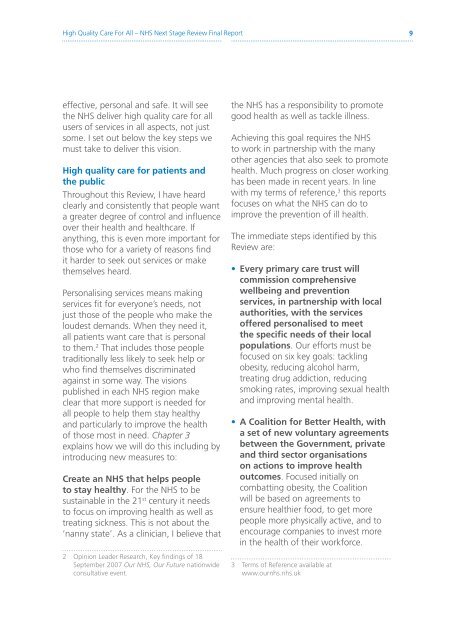High quality care for all NHS Next Stage Review - Antibiotic Action
High quality care for all NHS Next Stage Review - Antibiotic Action
High quality care for all NHS Next Stage Review - Antibiotic Action
You also want an ePaper? Increase the reach of your titles
YUMPU automatically turns print PDFs into web optimized ePapers that Google loves.
<strong>High</strong> Quality Care For All – <strong>NHS</strong> <strong>Next</strong> <strong>Stage</strong> <strong>Review</strong> Final Report9effective, personal and safe. It will seethe <strong>NHS</strong> deliver high <strong>quality</strong> <strong>care</strong> <strong>for</strong> <strong>all</strong>users of services in <strong>all</strong> aspects, not justsome. I set out below the key steps wemust take to deliver this vision.<strong>High</strong> <strong>quality</strong> <strong>care</strong> <strong>for</strong> patients andthe publicThroughout this <strong>Review</strong>, I have heardclearly and consistently that people wanta greater degree of control and influenceover their health and health<strong>care</strong>. Ifanything, this is even more important <strong>for</strong>those who <strong>for</strong> a variety of reasons findit harder to seek out services or makethemselves heard.Personalising services means makingservices fit <strong>for</strong> everyone’s needs, notjust those of the people who make theloudest demands. When they need it,<strong>all</strong> patients want <strong>care</strong> that is personalto them. 2 That includes those peopletradition<strong>all</strong>y less likely to seek help orwho find themselves discriminatedagainst in some way. The visionspublished in each <strong>NHS</strong> region makeclear that more support is needed <strong>for</strong><strong>all</strong> people to help them stay healthyand particularly to improve the healthof those most in need. Chapter 3explains how we will do this including byintroducing new measures to:Create an <strong>NHS</strong> that helps peopleto stay healthy. For the <strong>NHS</strong> to besustainable in the 21 st century it needsto focus on improving health as well astreating sickness. This is not about the‘nanny state’. As a clinician, I believe that2 Opinion Leader Research, Key findings of 18September 2007 Our <strong>NHS</strong>, Our Future nationwideconsultative event.the <strong>NHS</strong> has a responsibility to promotegood health as well as tackle illness.Achieving this goal requires the <strong>NHS</strong>to work in partnership with the manyother agencies that also seek to promotehealth. Much progress on closer workinghas been made in recent years. In linewith my terms of reference, 3 this reportsfocuses on what the <strong>NHS</strong> can do toimprove the prevention of ill health.The immediate steps identified by this<strong>Review</strong> are:• Every primary <strong>care</strong> trust willcommission comprehensivewellbeing and preventionservices, in partnership with localauthorities, with the servicesoffered personalised to meetthe specific needs of their localpopulations. Our ef<strong>for</strong>ts must befocused on six key goals: tacklingobesity, reducing alcohol harm,treating drug addiction, reducingsmoking rates, improving sexual healthand improving mental health.• A Coalition <strong>for</strong> Better Health, witha set of new voluntary agreementsbetween the Government, privateand third sector organisationson actions to improve healthoutcomes. Focused initi<strong>all</strong>y oncombatting obesity, the Coalitionwill be based on agreements toensure healthier food, to get morepeople more physic<strong>all</strong>y active, and toencourage companies to invest morein the health of their work<strong>for</strong>ce.3 Terms of Reference available atwww.ournhs.nhs.uk





